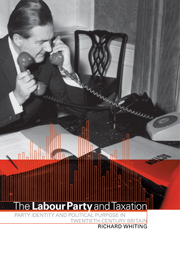Book contents
- Frontmatter
- Contents
- List of tables
- Acknowledgements
- List of abbreviations
- Introduction: Taxation and political debate
- 1 Struggles within a liberal inheritance, 1906–1940
- 2 The changing balance of tax interests, 1940–1954
- 3 The Kaldor era, 1951–1965
- 4 Social democracy examined, 1965–1970
- 5 Defensive positions, 1970–1979
- 6 Epilogue: New Labour, old problems?
- 7 Conclusion
- Select bibliography
- Index
5 - Defensive positions, 1970–1979
Published online by Cambridge University Press: 07 August 2009
- Frontmatter
- Contents
- List of tables
- Acknowledgements
- List of abbreviations
- Introduction: Taxation and political debate
- 1 Struggles within a liberal inheritance, 1906–1940
- 2 The changing balance of tax interests, 1940–1954
- 3 The Kaldor era, 1951–1965
- 4 Social democracy examined, 1965–1970
- 5 Defensive positions, 1970–1979
- 6 Epilogue: New Labour, old problems?
- 7 Conclusion
- Select bibliography
- Index
Summary
In putting forward a programme in the 1960s which blended radicalism and ‘modernization’, Labour's social democrats chimed in perfectly with the mood of the times. Ten years later their position was far more defensive. Partly through the loss of conviction that seemed to permeate the party in the last years of the 1960s, or because of Britain's deteriorating economic position that, to put it at its best, Labour had done little to ameliorate, the kind of tempered intervention which characterized social democracy seemed less secure than either unfettered private enterprise or more vigorous state control. It was no longer able to determine the agenda for change.
What was true for the economy generally held good for taxation in particular. At the beginning of the Wilson governments the reforms developed within the party had also linked up with ideas for change existing beyond the party conflict. In the 1970s the association between party political discussions and tax reform more generally became weaker, in that the way the politicians talked about tax was very different from the more academic view. Labour was partly responsible for this, in that its tax reforms provoked efforts to find a home for systematic tax thinking outside government. The main embodiment of ‘expert’ tax thinking from the 1970s onwards was the Institute for Fiscal Studies. This had been set up after Callaghan's 1965 reforms out of concern that such major changes could have been introduced with little informed public discussion of the measures involved.
- Type
- Chapter
- Information
- The Labour Party and TaxationParty Identity and Political Purpose in Twentieth-Century Britain, pp. 214 - 258Publisher: Cambridge University PressPrint publication year: 2001



